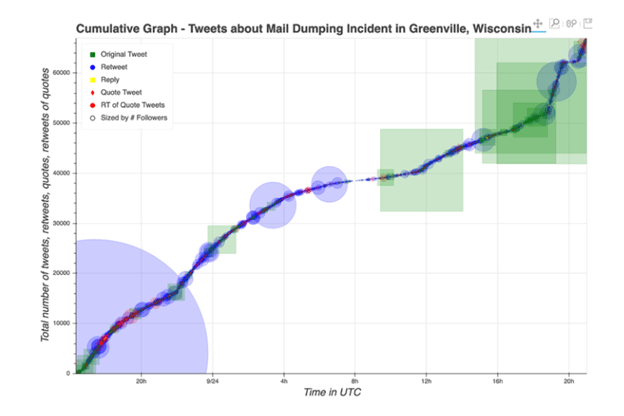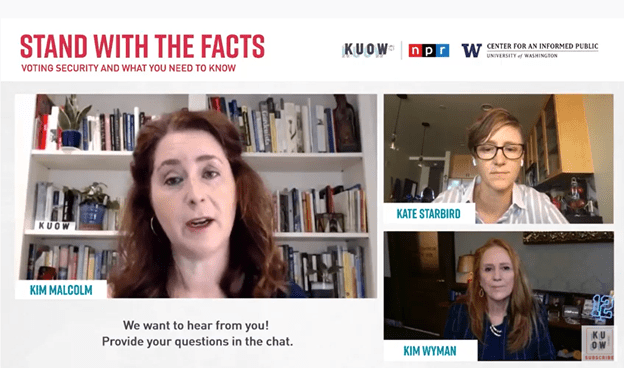This is a web version of the Center for an Informed Public’s News & Insights newsletter for July 2020, which was sent out on July 30. Check out our newsletter archives. Not signed up to received the CIP’s newsletter? Register here.
Center for an Informed Public’s Election Integrity Partnership work ramps up ahead of November
In July, the University of Washington‘s Center for an Informed Public joined forces with the Stanford Internet Observatory, the Atlantic Council‘s Digital Forensics Lab and network analysis firm Graphika to stand up a nonpartisan rapid-response analysis team, the Election Integrity Partnership, to detect and mitigate the impact of attempts to prevent or deter people from voting or to delegitimize election results. As voters across the United States prepare to participate in federal, state and local elections — or pursue early-voting or mail-in ballot options — a team of CIP researchers and UW students, including PhD students, master’s students and undergraduate research assistants, have been incredibly busy with Election Integrity Partnership monitoring and analysis work.
Check out recent highlights from the CIP’s contributions to the EIection Integrity Partnership …
- CIP-iSCHOOL LECTURE SERIES: CIP’s Starbird, Roesner discuss misinformation, U.S. elections
// WATCH … - INFO LITERACY: CIP’s West kicks off AARP’s “Sorting Fact From Fiction” series
// WATCH … - DEEPFAKE AWARENESS: CIP virtual event examines deepfakes, synthetic media
// WATCH …
SPOTLIGHT
‘Stand With the Facts’ series continues on KUOW with election focus
This past spring, the Center for an Informed Public kicked off a special virtual event series with KUOW public radio in Seattle focused on misinformation awareness and designed to give people insights, techniques and skills to be better information consumers and prepared to resist disinformation and misinformation. Although the initial series wrapped up in July, the Stand With the Facts series was reprised in September with a focus on disinformation, misinformation and voting. On Sept. 22, KUOW’s Kim Malcolm interviewed the CIP’s Kate Starbird, an associate professor in the UW Department of Human Centered Design & Engineering, and Washington Secretary of State Kim Wyman about voting security.
The Stand With the Facts series, which has featured the CIP’s Jevin West (a UW Information School associate professor), Carl Bergstrom (a UW Department of Biology professor), Ryan Calo (a UW School of Law professor), Chris Coward (an iSchool senior principal research scientist and director of the Technology & Social Change Group) and Lisa G. Rosenblum (executive director of the King County Library System), continues Oct. 13 at 1 p.m. PDT with a discussion about how election disinformation targets communities of color. That event will feature Michelle Merriweather (president and CEO of the Urban League of Metropolitan Seattle) and Oskar Zambrano (director of civic engagement and advocacy at the Latino Community Fund).
- Check out this recent KUOW article for highlights from the entire Stand with the Facts series and valuable lessons about misinformation.
INSIGHTS
Numbers ‘really seem to just directly drop from nature’ and ‘seem precise, objective and scientific’
In September, the Center for an Informed Public launched a new virtual lecture series with the UW Information School featuring CIP principal investigators and other affiliated researchers. The CIP’s Carl Bergstrom and Jevin West kicked off the lecture series with a discussion about their recently released book, “Calling Bullshit: The Art of Skepticism in a Data-Driven World,” which grew out of the popular University of Washington class the two developed and co-taught.
“The issue here at the heart of everything that we were doing with the class, what we do with this book and also with a lot of the work I do at the Center [for an Informed Public], is that we aren’t teaching our students to question numbers in the same way they question language and rhetoric and clickbait they might see online. We’re quite good as humans at spotting bullshit in words, but it’s those numbers that are harder and really seem to just drop directly from nature. They seem precise, objective and scientific,” West said during the Sept. 16 lecture. “People don’t feel as confident” when they need to question numbers and statistics “and we want to make people confident. … Honestly, the book that we wrote was very much meant to be an empowering book to make people feel like they could do that.”
Watch the full lecture from Bergstrom and West …
CIP in the News
Since the Center for an Informed Public officially launched late last year, our researchers have been regularly interviewed, quoted or otherwise featured in various local, regional and national news outlets, livestreams and podcasts.
- The CIP’s Jevin West and Kate Starbird (pictured above, at left) were both featured in a recent KING5 “New Day Northwest” special presentation that offered expert advice about how to identify truth, fraud and stop the spread of misinformation. The KING5 special was sponsored by AARP Washington State, which has partnered with the CIP on a misinformation awareness and factchecking initiative. [KING5]
- Following President Trump’s response to a Sept. 29 debate question about white supremacists, Starbird told The Washington Post that “[t]alking points about white supremacy developed among influencers on both sides of the Twitter spectrum.” [The Washington Post]
- West was interviewed by KXLY-TV in Spokane in a segment about misinformation awareness and the work of the Center for an Informed Public. “If we just think more, share less, I think we’d be better off as a world,” West said. [KXLY]
- CIP postdoctoral scholar Kolina Koltai was interviewed on KUOW’s “The Record” to discuss how health influencers on social media platforms are spreading misinformation about COVID-19 and mask use. [KUOW]
- Koltai was also interviewed by CNBC regarding public sentiments around the uncertainties of rolling out a national vaccination campaign when a COVID-19 vaccine becomes available. “I’m hearing from people who say they want other people to test [the vaccine] first,” Koltai said. “There’s a lot of uncertainty.” [CNBC]
- In a Reuters article about how Twitter is testing to see how its misinformation label can be more direct and obvious, Starbird pointed out one of the major challenges in containing the spread of problematic content on the social media platform. “Mostly things take off so fast that if you wait 20 or 30 minutes … most of the spread for someone with a big audience has already happened.” [Reuters]
- In a Slate article about app-based COVID-19 automated contact tracing, the CIP’s Ryan Calo said that broader adoption of app-based tools to mitigate risks of transmission won’t likely overcome some fundamental challenges with controlling the spread of the coronavirus. “I don’t know that adoption is going to be good enough nor even that adoption is the biggest hurdle,” Calo said. “Absent a real sea change in the way that we address the disease, [native support] is not likely to overcome the problems.” [Slate]
- In an Insider article about celebrities of color facing an onslaught of conspiracy theories, Starbird said that “it’s really difficult for the targets of these campaigns because almost anything they do gets wrapped back up” into the theory and “[a]lmost any action they take can be melded into the conspiracy theory itself.” [Insider]
- In an Association of American Medical Colleges article about doctors who are on the front lines of misinformation coming from their patients, friends and loved ones, Starbird says that medical professionals should “[s]tart with empathy” and “[a]cknowledge that the information space is difficult and you can understand why somebody would be confused, even skeptical.” [AAMC]
Research Notes
- A proposal submitted by UW Information School assistant professor Tanu Mitra, who recently joined the CIP as a faculty member, and PesaCheck, an East African fact-checking initiative, was recently awarded nearly $100,000 from the International Fact-Checking Network as part of the second round of IFCN’s Innovation in Fact-Checking Initiative. According to the proposal, the “project aims to computationally audit YouTube for mis/disinformation and build effective machine-assisted expert fact-checking workflows so as to measure the prevalence of search-based misinformation on YouTube. This proposal specifically focuses on persistent conspiratorial information and disinformation influence campaigns in the African context that have been fact-checked or otherwise debunked by PesaCheck and its partners at Code for Africa‘s iLAB and the Atlantic Council‘s Digital Forensics Lab.”
- CIP principal investigator Emma Spiro, a UW Information School associate professor, is scheduled to appear virtually during an Oct. 14 panel discussion at the annual meeting of the Academic Data Science Alliance, “Rapid Response Data Science: Frameworks for Effective Mobilization During Crises.”
- CIP principal investigator Kate Starbird, a UW Human Centered Design & Engineering associate professor, discussed disinformation during a Sept. 23 virtual keynote talk at the National Science Foundation‘s 2020 Cybersecurity Summit for Large Facilities and Cyberinfrastructure.




